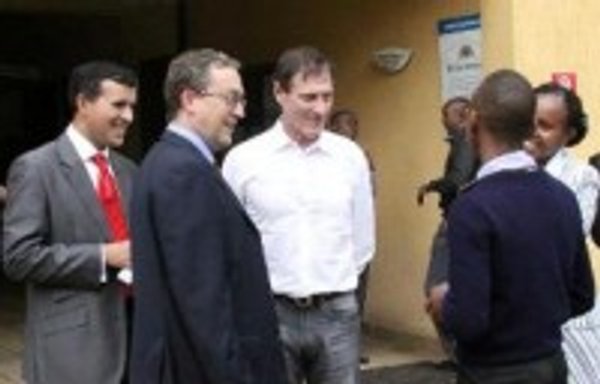‘The Killing Fields’ is one of the most gripping movies I have watched. It is among the British Film Institute top 100 films, 30thon the 100 Greatest Tearjerkers, and 60thon the American Film Institute’s list of America’s most inspiring movies.
When I heard its Director Roland Joffe was coming to Kenya for the screening of his latest movie, I was naturally excited. Among the seven academy award nominations the 1984 movie got was that the best director for Joffe. It won academy awards for Best Supporting Actor for HaingNgor, Best Editing, and Best Cinematography. Ngor is one the two non-professional actors to win an Academy Award in an acting category. The other is Harold Rusell.

During his visit to Kenya, Joffe visited 3 educational undertaking inspired by St Josemaría Escrivá, founder of Opus Dei, one of the main characters in his latest film. Joffe gave lectures and met students at Strathmore University, Kianda Girls High School and Kimlea Girls Training Centre. Joffe also visited Kwetu Home for street children and the poor villages around Tigoni, where some of the students of these institutions come from and do social work. Joffe was moved to see how the message of St Josemaría, whom he studied for more than a year before the shooting of There Be Dragons, has had an impact on African people.
Joffe’s movies are not your usual bad guy, good guy stuff. They are complex because as I learnt listening to him on Monday, 21stNovember talking first to teenage girls at Kianda School and then to journalists and a more diverse audience at Strathmore University.
The first question that he was asked by the girls at Kianda was why he gave his latest movie the enigmatic title: ‘There Be Dragons’. He gave a 13 minute answer! The gist of the answer was: the movie is about human weakness.
Dragons in the title refers to things we are all uneasy about ourselves. He gave an example of himself. “I was a difficult pupil. If a teacher said we were going to do a certain poem, I would look for many reasons not to do it. I never asked myself: why not this poem. My dragon was that I was overly individualistic,” he reflected.
Joffe said that the mainstream approach to science today is reductionist. “Science tells us that we are just devolved chemicals; improved apes. That there is nothing special about us. It forgets freewill.”
He added: “About five years ago, neurologists would have told you that you are just your brains. But there is a difference between brain and mind. Mind means we can choose. Science cannot tell us about human consciousness. And in fact, we have the ability to change our brains, our neurotic make up”.
He said that although people are different, they have the same insecurities. They worry about being accepted, loved, and rejected. “There are two things that are difficult to do: to love and to forgive. It is easier to hate than to love,” he said.
But he talked about the power of forgiveness. “I watched a CNN interview a woman having tea with a man who had killed all her family members. The interviewer asked the woman why she was having tea with him and she said: why should I let him win. I don’t want this to happen again! I was over-awed,” Joffe said.

“It takes work to forgive. But nothing good is easy. I don’t know why. But if we work at it, we become better because our brains are elastic and can change,” he said.On being asked how making the movie had affected him personally he replied that he was brought up to believe that God is irrelevant and boring – some dude seated somewhere with a white beard giving merit points.
“I also grew up being made to believe that coke and banks are good. My views about God should not matter to anybody. St Josemaria, (the founder of Opus Dei and the person on whose life the movie is based) believed in God and believed that he communicated with Him. And human beings could dedicate their lives to this essence. You must accept when you write that this is the truth,” he said.
“There isn’t such a thing as Opus Dei in the same way there is a political party. Political parties tell you what to believe. St Josemaria taught that we are children of God. He didn’t tell you what to think. He taught that you do everything for love of God,” Joffe expounded.
Some of the recurring questions were why he makes movies that explore humanity. A journalist asked him what his favourite movie is. He said he had many favourite movies but he singled out ‘2001’.
He also revealed that he will next year start working on a movie on Desmond Tutu and the truth and reconciliation process in South Africa.
By Eric Kathenya
